Newsletter


Our Newsletter
Connections
Jul
11
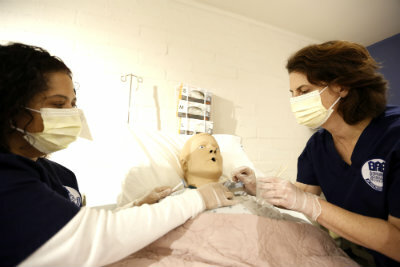
New Staff Education Courses at Annenberg
For the past 105 years, the Los Angeles Jewish Home has provided seniors in the Greater Los Angeles area with vital programs and services. With a team of nearly 1,500 professionals working to provide the community’s older adults with outstanding, high-quality care, the Jewish Home is one of the largest employers in the San Fernando Valley.
The Home offers its employees a rewarding working environment with generous benefits, compensation, and advancement opportunities. Training programs include instruction from the Home’s Annenberg School of Nursing (ASN) as a home health aide (HHA), certified nursing assistant (CNA), and licensed vocational nurse (LVN). No other senior care provider in Southern California offers so many advancement opportunities.
To continue the tradition of staff enrichment, the Jewish Home has partnered with ASN to provide employees with three complimentary courses – restorative nurse assistant, medication technician, and medication technician recertification.
Restorative Nurse Assistant
Employees seeking a restorative nurse assistant (RNA) certification will learn techniques for helping patients increase strength and mobility levels, resulting in an enhanced quality of life. The two day RNA program is for current CNAs with at least 6 months experience, a high school diploma or GED, and a recommendation from the director of nursing.
Medication Technician*
Employees seeking a medication technician certification will be trained to prepare and provide patients with non-injectable prescription medications. The two day medication technician program is for current CNAs with at least 6 months experience, a high school diploma or GED, and a recommendation from the director of nursing.
Medication Technician Recertification
Employees seeking a medication technician recertification will receive a refresher course in the preparation and distribution of non-injectable prescription medications. The eight hour medication technician program is for current medication technicians only.
The three courses will be available to staff through the end of August. For more information, please contact Cyndi Meyer at (818) 757-4431 or [email protected]
*This course is waitlisted for May, June, and August
Jun
19
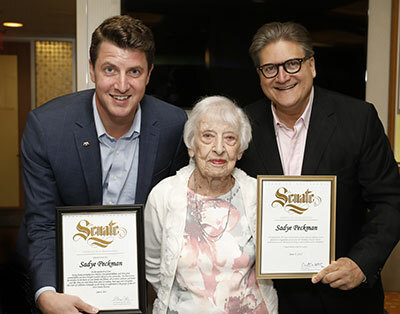
BCSC Welcomes Visitors
On Friday, June 9th, California State Senators Robert Hertzberg and Henry Stern stopped by to mingle with BCSC participants. Following lunch with participants, BCSC Executive Director Susie Fishenfeld provided the Senators with a tour of the Center. Both Senators offered their thanks to the seniors and stressed their support of the Los Angeles Jewish Home and BCSC.
“We all stand on your accomplishments,” said Senator Hertzberg. “Everyone in this room has a great story. You built this city. You built this community. I offer my respect to you and want you to know we don’t forget.”
“The Home and seniors are very important to me,” said Senator Stern. “I work for you. I’m here to serve you,” he added.
During their visit, both Senators honored BCSC participant Sadye Peckman, who is 101 years young. She received certificates commending her life and recognizing her important contributions to her family and community.
On Monday, June 12th, a grand day was had by BCSC participants and staff when the well-known Mexican actor, Eduardo Yanez, visited the Center. Eduardo is making Los Angeles his home away from his Mexican home as he pursues new and exciting opportunities and projects in "Hollywood".
BCSC Marketing Director Santos Rodriguez (left), BCSC Executive Director Susie Fishenfeld (center), Eduardo Yanez.Eduardo provides care for his elderly mother who lives in Mexico and understands the daily challenges caregivers face. He is a community minded individual and understands the importance of access to community resources for an improved quality of life. Univision, a BCSC community partner, shared with Eduardo information about the BCSC PACE program which led to the visit. During his visit, he encouraged the BCSC participants to share their stories and memories through writing, painting, singing and any other way they can share those memories.
Both visits were enjoyed by all and will continue to be a special memory for BCSC participants and staff.
The Brandman Centers for Senior Care is the only Program for All-inclusive Care for the Elderly (PACE) in the San Fernando Valley. BCSC serves seniors age 55 and older who live in the BCSC service area, need coordinated medical care to continue living safely and as independently as possible in their own home and community.
To view the photo album of our visitors, click here.
Jun
19
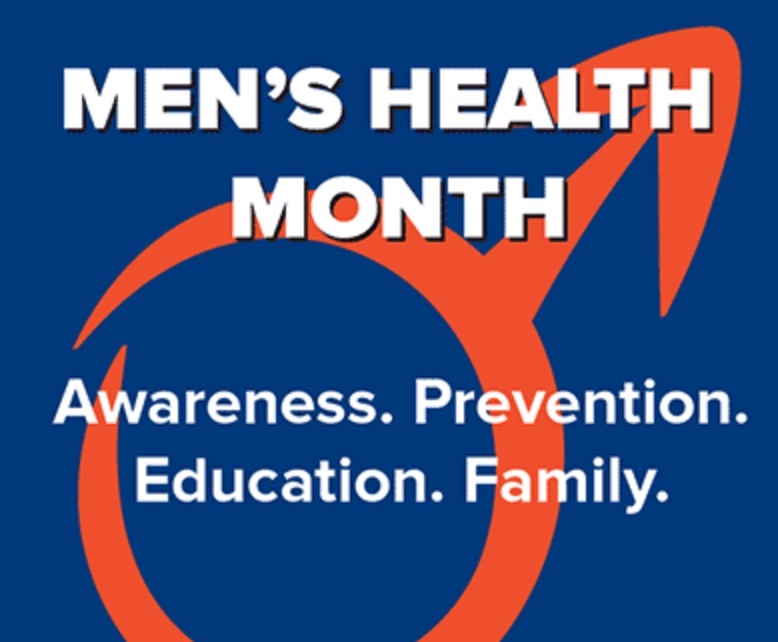
Men’s Health Month
Men’s Health Month is celebrated each June with health, education and outreach activities, screenings, and health fairs. The purpose of Men’s Health Month is to raise awareness of preventable health problems and encourage early detection and treatment of disease among men and boys.
Men and women face many of the same health challenges, such as:
maintaining a healthy diet and weightexercising regularly to keep our bodies strong and functioning at their bestgetting enough sleep, at least 7-9 hours each nightquitting smoking to lower risk of heart and lung diseases and cancercoping with stress
While the life expectancy gap between men and women has decreased, women still live an average of 5.2 years longer than men. In general, men tend to smoke and drink more than women and often don’t seek medical attention as often as women.
There are also health conditions that only affect men, such as prostate and testicular cancers. According to the MD Anderson Cancer Center, here are 10 cancer symptoms men should be aware of and seek medical attention for right away:
Abnormal lump: a mass or lump in the breast, testicles, lymph nodes and soft tissues such as tendons and ligamentsChanges in testicles such as a change in size or if they feel swollen or heavyChanges in restroom habits including increased frequency, pain when going, blood in urine or stool, persistent diarrhea or constipationChanges in your skin such as unusual bleeding, scaling or sores that do not heal as well as warts, moles and freckles that change color, size or shapeIndigestion or trouble swallowing, such as a prolonged painful burning sensation in your throat or chestPersistent cough or hoarseness, wheezing, shortness of breath or coughing up bloodChanges in your mouth, including white patches, sores, unexplained bleeding, numbness or tenderness of tongue, cheeks and lipsUnexplained weight loss not due to change of diet or exercise routineConstant fatigue regardless of how much rest you getPersistent pain such as back pain, headache or stomach ache can often be the first sign that something is wrong.
So, men! Please use Men’s Health Month to schedule a medical checkup with your doctor and take a personal inventory of your current overall health and lifestyle. Many health issues can be treated and resolved with early detection, and that begins with you!
Jun
5
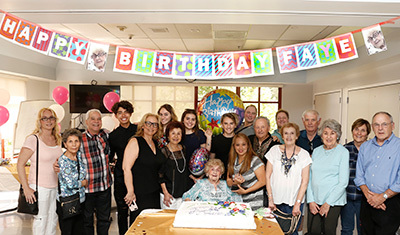
Celebrating 106 Years of Positive Living
What is the secret to living to 106? According to Jewish Home resident Faye Levitt, "It's part luck and part the way you are. You have to be happy with yourself and have a good attitude and good friends." Last week, luck, attitude and friendships brought Faye to her 106th birthday, which she celebrated with family and friends. Held at the Home's Grancell Village Campus, the party was a collaborative effort of Faye's family and the activities department of the Mark Taper Building where Faye resides. The room was festively decorated for the occasion with pastel balloons, floral centerpieces and a Happy Birthday banner featuring photos of Faye. A beautiful cake tempted everyone until Faye did the honors of making the first slice. As a member of the activities staff played Happy Birthday on a baby grand piano, everybody sang along, wishing Faye all the best and many, many more. A self-confessed "shopaholic," Faye was glowingly beautiful in a new blue top and her hair freshly coiffed. The youngest of five children, Faye was born in Philadelphia, Pennsylvania, to Anne and Harry Reader, who were from Austria. Anne and Harry moved their family to Galveston, Texas to open a jewelry store. Though business was good, sometimes the town would flood, with water entering their store and rising to the bottom of the safe. A friend suggested they consider moving to Taft, California, near Bakersfield. At the time, Taft was a booming oil town, so the family packed up and relocated. As she got older, Faye loved getting dressed up and going to work in the store, something she would do for decades to come. To this day, she still takes great care to always look her best. Another family move brought everyone to Santa Monica, where a new store was opened. It was in Los Angeles that Faye met her husband-to-be, Ben, through a girlfriend. After dating for one year, they married and went on to have two children, Ken and Myrna. Now Faye's family includes four grandchildren and three great-grandchildren, all living nearby. She is also the only – and favorite - aunt to the thirteen children and grandchildren on Ben's side of the family, many who were on hand to celebrate her birthday. "She has become mother to all my friends as their own mothers have passed away," exclaims Myrna.
Throughout their marriage, Faye and Ben worked together in the store and enjoyed traveling with a group of friends, visiting Israel, Spain, France, England, Italy…and Vegas. When he was 85, Ben passed away, and Faye, who was 75, began living on her own in an apartment in Encino. There she made friends with a group of women and they did a lot of fun things together, including barbecuing at Faye's place. When she was 93 and had to give up driving, Faye moved to an assisted living facility where she lived for about 14 years. As always, she made a lot of friends and enjoyed socializing. Although she has never had a serious illness or surgery, she began to need more care. Ken and Myrna suggested the Jewish Home. "The Home was recommended to us by so many people," explains Myrna. "And it is a wonderful place! Since coming here, our mother is eating better, exercising, participating in activities, and attending Shabbat and holiday services." "With our mom living here at the Home, we know she is taken care of and we don't have to worry," says Ken. "I feel lucky to have my mom with us at 106! She's smart, sharp, has a great memory and sense of humor. It's amazing what she has experienced and seen in her lifetime." Though she's only been at the Home for a few months, Faye encourages others to consider making the move. "It's made a big difference in my life," she says. "As you get older, it's better to be around other people than to be living in a place by yourself. It gives you the opportunity to communicate with others. Here at the Home, the care is great, the employees are wonderful and the food is good!" Reflecting on her 106th birthday celebration, Faye "is elated! I see all my relatives and friends and it's a pleasure. I'm happy to be able to enjoy this because it's not usual that a person my age would be able to experience this. I am thankful to my family and the Jewish Home staff for making this party so wonderful!" On behalf of the Jewish Home, mazel tov to Faye on this milestone occasion. We wish her good health and happiness in the years to come.
To see more photos of Faye's 106th birthday celebration, click here.
May
31
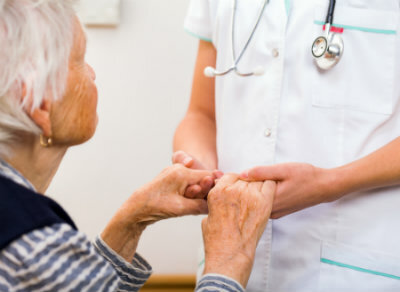
What is a Geriatrician?
If you have a senior loved one in your life or are a senior yourself, you’re probably familiar with the word geriatrician. But in reality do you know what this term actually means?
A geriatrician is a fully trained physician specializing in the diagnosis, treatment, and care of seniors. In most cases, geriatricians are primary care physicians, board-certified in internal or family medicine. Before becoming a geriatrician, most complete a one-year, post-residency fellowship in the field of geriatrics. Geriatrics is the branch of medicine catering to older adults. Once the fellowship is completed, the geriatrician is ready to perform his or her primary role – enhancing the quality of life for seniors as they age. However, those physicians who went into the field prior to the development of formal training programs, had the ability to take a written test that demonstrated their knowledge in the field and get certified as a geriatrician.
Geriatricians play a major role in a senior's health and well-being, providing diagnosis and treatment to patients with complicated medical conditions. Seniors with age-related illnesses, disabilities, and/or prolonged use of prescription medication can greatly benefit from the carefully crafted care plans geriatricians create.
These specialists usually start with a complete assessment of each patient's physical, psychological, cognitive, and social function. Once the doctor is familiar with a senior’s health profile, he or she work closely with the entire care team to develop a comprehensive plan of care.
Geriatricians are ready and willing to provide their patients with information and insight to make tough decisions easier to navigate. They can also help to take the load off of family caregivers who are struggling with caring for a senior loved one at home. With a quick evaluation of the senior’s living space, geriatricians propose small modifications to make home life easier and safer.
Many experienced geriatricians excel in providing key suggestions to continuously improve the quality of life for seniors.
At the Los Angeles Jewish Home, chief medical officer Dr. Noah Marco leads a team of noted geriatricians who provide award-winning services to seniors on site. “Many in the field consider the Jewish Home as one of the birthplaces of Geriatric Medicine,” says Dr. Marco. “When UCLA established the Multicampus Program in Geriatric Medicine and Gerontology in 1979, it affiliated with the Los Angeles Jewish Home as a place for its doctors to get their experience. We are fortunate that several of our doctors graduated from that program.”
If you or a senior you know are interested in healthy aging or looking to receive life-enhancing care, consider making an appointment with a geriatrician. Call the Home’s convenient, toll-free Connections to Care hotline 855.227.3745, or visit the American Geriatrics Society site and use the Find a Geriatrics Healthcare Professional tool to find a geriatrician near you.
May
11
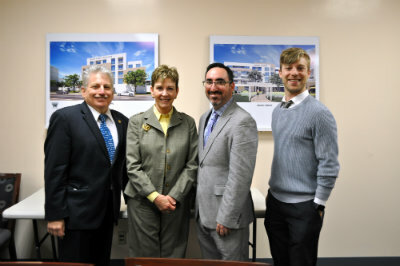
The Home Hosts State and Federal Representatives
This morning, Jewish Home CEO-President Molly Forrest and Jewish Home CMO Dr. Noah Marco met with representatives Scott Abrams from Congressman Brad Sherman's office and Ian Anderson from Assemblyman Matt Debabneh's office.
The group toured the Eisenberg and Grancell Village campuses and then sat down to discuss the Home's exciting future. Molly was delighted to meet with the gentlemen, "It's wonderful to have federal and state representatives visit us and learn about the Home's commitment to seniors."
Apr
27

Join Us for the World’s Largest Mother’s Day Celebration
On Sunday, May 14, 2017, the Jewish Home will host the twenty-third annual World’s Largest Mother’s Day Celebration. The event will honor the Home’s mothers, grandmothers, great-grandmothers, and even great-great-grandmothers on both the Grancell Village and Eisenberg Village campuses.
The Mother’s Day Celebration will begin at 10:30 a.m. Everyone can enjoy a festive brunch while listening – and dancing – to the music of the Skye Michaels Orchestra.
Chaired by Marcee Weiss and Debbie Weiss, the event promises to provide a wonderful opportunity for 1,000 seniors and their families to gather together to celebrate this special day.
Tickets for adults (age 12 and older) are $25.00 each and children’s tickets (ages 5-11) are $12.00 each. There is no charge for Jewish Home residents and children under age 5. Tickets must be purchased by Friday, May 5th.
For more information and to purchase tickets to the World’s Largest Mother’s Day Celebration, please contact Denise Horowitz at [email protected] or (818) 774-3324.
Apr
14
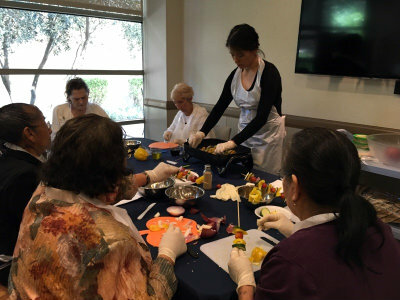
Something’s Cooking at BCSC
Last month, seniors gathered in the Brandman Centers for Senior Care (BCSC) to participate in the Center’s newest activity —a healthy cooking class. The course, one in an ongoing monthly series led by BCSC activities coordinator Karla Lopez, showcased simple recipes for vegetable-centric meals and snacks.
Seniors sat at their work stations, donning aprons and gloves, excitedly awaiting instruction. Equipped with knives, cutting boards, skewers, and an assortment of fresh vegetables, the participants had everything they needed to begin. Karla started the lesson with an announcement. “Today we will be making grilled vegetable skewers – a delicious, balanced meal that only takes 25 minutes to make.” The room began to buzz with excitement.
Participants followed Karla’s detailed directions, carefully peeling onions, chopping bell peppers, halving mushrooms, and finally skewering the mixture of colorful vegetables. Once the fresh components were assembled, Karla placed three skewers on a pre-heated portable grill, demonstrating how to properly prepare the food.
Participants took turns manning the grill, patiently waiting to flip the skewers until vegetables were tender and the edges were slightly browned. After only a few minutes, the batch of skewers were cooked to perfection. Seniors took their seats and prepared to enjoy the fruits of their labor. Karla said, “And now it’s time for the best part, the taste test.”
Seniors bit into the juicy, grilled vegetables and were delighted with the results.
“These are delicious!” Brandman Center participant Maria Hernandez exclaimed. “I never knew making a healthy meal could be so easy. I love coming to Karla’s classes, I’ve learned so much about nutritious cooking.”
BCSC’s registered dietician nutritionist Randi Drasin explains the importance of the class. “Eating healthy is an essential part of living a long life. Seniors and people of all ages can greatly benefit from maintaining a healthy diet, high in fruits and vegetables. BCSC’s new cooking class exposes participants to delicious plant-based meal options and fresh cooking concepts, showing seniors eating healthy can be easy, inexpensive, and fun.”
“At the Brandman Centers, we offer a variety of unique activities to engage, educate, and inspire seniors,” says Jillian Simon BCSC director. “Our monthly cooking classes provide our participants with an exciting, hands-on experience they can easily recreate at home. Activities like these provide seniors the tools they need to continue to lead active, independent lives in the comfort of their own homes.”
For more information about adult day healthcare at the Brandman Centers for Senior Care, please click here to visit the BCSC website or call 818.774.8444.
